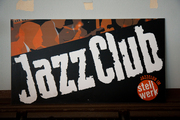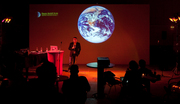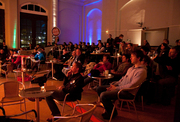- Find everything covered from today’s chat in Starfire, a concept video by Sun (1994) http://mprove.de/script/04/nng/starfire.html \*
- My parting remarks for today: \*
- Cisco pushes video conferencing to increase the need for bandwidth, in order to sell more routers. \*
- The shared working space is more important than watching people sitting around two tables – one real, the other virtual. \*
- Do professional video conferencing systems support shared whiteboards? Two or more teams in different cities working with additional media? \*
- Training and testing and learning is important to facilitate useful remote meetings. \*
- most of the people do not know how to conduct a proper video conference. \*
- You have a telly in the corner, too small to be useful. \*
- In addition, many conference rooms with state of the art video conferencing systems are not really suited for such. \*
- You spend too much time in preparing and fighting system errors instead of focussing on the content of the meeting. \*
- Most of the time the technology is too complicated to use with ease. \*
- … they can extend the time between real live meetings. To that extend they are saving real money. \*
- In my opinion video conferencing cannot replace meetings in RL. But… \*
- But I suppose you do net get a real sense for it without trying it yourself for several times. \*
- It is either expensive, and you do not want to waste you company’s resources. Or it is obtrusive, disturbing, and distracting. \*
- Video conferencing as presented in the video feels artificial to me. \*
- CBS feature on video conferencing http://www.youtube.com/watch?v=dapC8Y1crEU \*
- Some of my OraTweets from the SocialChat # 8 on Video Conferencing – Nice to have or needed? \*
Category: Interface Culture
SocialChat: Don’t stop making waves
 SocialChat topic this time was on building professional networks, and how to promote yourself. Read my share bottom up:
SocialChat topic this time was on building professional networks, and how to promote yourself. Read my share bottom up:
- And don’t stop making waves, where ever you are! \*
- Cons: Poor authoring tools in general. It is even worse to edit hyperlinks. And that should be key in the web! \*
- I have basically 8 blogs – Pros: others can easily pick up the content. And the simple chronological navigation. \*
- … so I’m not flattered very much when a headhunter approaches me and just says, “I find your profile on XYZ interesting…” \*
- I am quite visible on the net, … \*
- This is how you build trust and reputation over time. \*
- Slideshare is even better b/c you contribute something substantial to the community. http://www.slideshare.net/mprove/ \*
- I favor Xing http://bit.ly/aVZF5A because of the groups. They persist a little longer than the pages of twitter or facebook. \*
- You collect contacts as two generations before collected stamps. So where is the point if there is no increasing value? \*
- The problem with most of the social sites is: You do not aggregate a personal value. There are lots of casual chats. \*
- Some of my OraTweets from the SocialChat #7 on professional networking, tools, and self-promotion… \*
SocialChat: Giving Back to the Community
Big companies feel the urge to give something back to the community. They support local and social activities with employee’s time and know-how. Oracle is no exception. Here are once again my contributions to our weekly SocialChat. You know the game. Read bottom up:
- Famous last words: Share your shit! — Evening Talk by Tor Nørretranders at reboot11 (video) \*
- If you mention your company name along the lines: even better! \*
- But since you get something back personally — trust, friends, reputation – it is worth every minute. \*
- If you want to support your community the effort is much higher. \*
- 1day/year doesn’t change anything. And I doubt that it is even effective due to the management overhead. \*
- Even better: Do good stuff and let others talk, blog and tweet about it. \*
- My mantra: Do good stuff and talk about it. Rephrased today as: Do good stuff and blog about it. \*
- What about organizing un-conferences? Think TED. Or http://raumschiffer.de/ \*
- I mean I do not even mow my own lawn. Why do it at the kindergarden next door? \*
- What about building and managing online communities? e.g. the UX Forum at Xing \*
- If I am running a local non-profit designers group, does it count as an Oracle supported volunteer project? http://uxhh.de \*
- …or align our individual forces and abilities on less but larger projects. \*
- If you want to make a difference you have to commit more time on the project, … \*
- …rather limited. It is important but the impact on the local community and the benefits for the company is low. \*
- I am really struggling with today’s topic. I see the value of individuals spending a number of days on scattered social projects as… \*
- Some of my OraTweets from the SocialChat #6 on “Giving back to the Community”… \*
SocialChat on Learning in Meetings
Learning and meetings. How does this fit together? If you exclude status meetings, jour fixes and team meetings for a while then there is a chance. Read my contributions to a recent Oracle SocialChat on the subject. I wonder what happens if I copy a stream of tweets here. Of course, it is still in reverse chronological order, and you have to read your way bottom up.
!yojne. elpmaxe rof tfel ot thgiR .esrow eb dluoc tI
saihttaM-
- Thanks you @aludding for facilitating the SocialChats. \*
- Here is another example of an icebreaker that I used recently http://www.slideshare.net/mprove/ixda-hh-kickoff \*
- … and a very good & open discussion in the afternoon. no Powerpoint the entire day. \*
- I’ve conducted a 1-day think tank. Opening video. mood maps, collecting ideas, clustering and sorting… \*
- You have to utilize other components to set the stage right for brainstorming & collaborative learning sessions. \*
- If you just use Powerpoint to prepare a meeting then you are already lost. \*
- Presenting is not learning. Preparing a presentation is. Attending a presentation might be. \*
- Powerpoint is a bad tool for learning. It is even a mediocre tool for presentations! \*
- On the other hand workshops and attending good (interactive) presentations can stimulate learning and aha! moments. \*
- Team meetings and status meetings are not suited for learning. \*
- Next steps might be follow-up meetings and formal prose in wikis. \*
- This is the first step after the meeting to really get something. This is the best and fastest way I know to keep the energy level up. \*
- A very simple and yet effective way to capture the results of a meeting is to take photos and put them on a blog. http://bit.ly/axjhMT \*
- 3) moderate the meeting 4) collect the findings for later use. \*
- but you have to use the tool ¨meeting¨ correctly. 1) set the expectactions right 2) have the right set and mix of people \*
- … learn new facts and new point of views and get to something that was beyond your own abilities. \*
- A meeting is also a tool for learning and eventually drawing conclusions. You meet with people, exchange ideas,… \*
- (Ha, OraTweets can be 256 characters long! So I have to break them up fro Twitter) \*
- I’ll share some of my OraTweets from the SocialChat #5 on Learning in Meetings… \*
- The SocialChats are summarized and captured for later reference. \*
- e.g. we had “Video conferencing – niche to have or needed?”, “How can we give back to the community?”, “How can we improve communication?” \*
- Each Friday we have a one hour SocialChat in OraTweet. The topics are proposed and voted during the week. \*
- Another idea to generate traffic and buzz for corporate microblogging are social gatherings. \*
- Commenting on blogs creates OraTweets. \*
- For instance status updates in OraTweet show up on your profile page in Connect (our internal Facebook) \*
- One important factor for successful E20 microblogging is the integration with other social software. \*
- Compared to Sweet at Sun http://blogs.sun.com/mprove/tags/sweet OraTweet is actually used. How comes? \*
- We have a corporate microblogging system at Oracle called OraTweet http://oratweet.com/ \*
BBC about the digital revolution
…in 24 YouTube parts by Aleks Krotoski
The Virtual Revolution is a British television documentary series presented by Aleks Krotoski, which began airing on BBC 2 on 30 January 2010. A co-production between the BBC and the Open University, the series looks at the impact the World Wide Web has had since its inception 20 years ago. The series took on a different approach to BBC documentary making by encouraging an open and collaborative production.
(via)
Bring on the learning revolution
Once again, Sir Ken Robinson at TED (via):
PS_ And 1h23′ talk at UCLA
Raum Schiff Erde Epilog
Hi,
we had a wonderful time at Raum Schiff Erde a couple of weeks ago. I would like to take the opportunity to thank all the presenters for sharing their ideas, and all the attendees for becoming members of our RSE crew. Thank you all for your participation and your good vibrations.
RSE10 is documented in various ways: on twitter, some blog postings, and a photo set by Helge who managed to capture the mood perfectly (gallery, 23).
The slides are up at slideshare, and the audio tracks are available on the podcast channel at podcampus.de. Please visit the program page to gain an overview on all presentations, audio casts, and additional references.



It was fun for us – and we hope you enjoyed the trip as well.
Have a safe journey on Spaceship Earth!
Monic, Valentin, Michael, Sebastian, and Matthias
On education and creativity
Sir Ken Robinson on education and creativity /link to talk
wonna more?
Raum Schiff Erde T-4

Wir sind ausgebucht! 🙂
Man kann sich aber noch auf die Warteliste eintragen und nachrücken. Dreien ist das schon gelungen. (Wer also weiß, dass er nicht kommen kann, der möge sich bitte austragen.)
Am Abend gehen wir zum Essen und “Soscheleising” ins Parlament unterm Rathaus. Zur Planung haben wir wieder eine Wiki-Liste eingerichtet.
Ich hoffe, wir sehen uns dann am Sonntag zum Raumschiff Er.de
Matthias
Raum Schiff Erde am 21.2.

Nun sind es noch 3 Wochen bis unser Raumschiff Er.de in Hamburg abhebt. Das vorläufige Programm der Veranstaltung lässt schon erahnen, dass es inspirierend und gut wird; die Mitreisenden tragen sich ins Wiki ein; das Chaos hinter den Kulissen ist ein kreatives.
Weitere Infos unter RaumschiffEr.de.